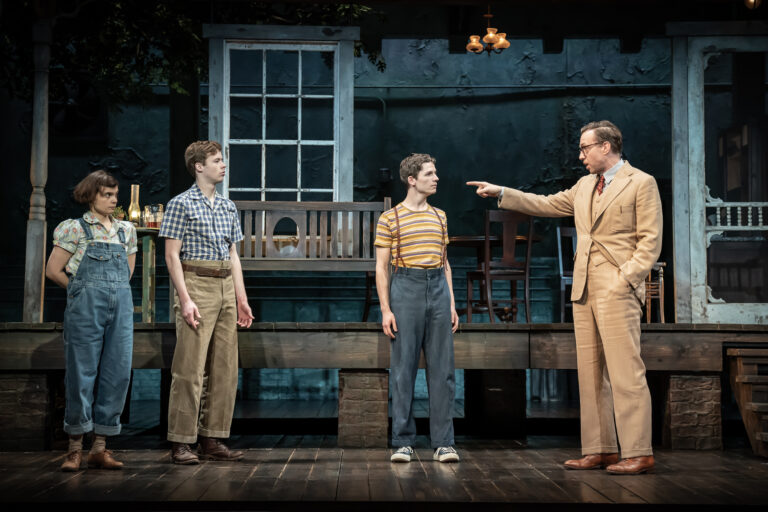Gielgud Theatre – booking until 19 November 2022
Reviewed by Claire Roderick
5*****
You mess with Harper Lee’s beloved novel at your peril, but To Kill A Mockingbird is in the safest of hands with Aaron Sorkin. It is easy to see why this story of racial prejudice in 1930’s Alabama made such an impact on Broadway in 2018 when Trump’s presidency swept aside any notions that these attitudes were consigned to history.
When Tom Robinson is accused of the rape of a white woman, his fate is seemingly sealed as no all-white jury could possibly find him innocent in 1930’s Alabama. When the judge asks Atticus Finch to defend Robinson in the hope that the town is becoming more tolerant and the jury may just consider the actual evidence, they reckon without the longstanding hierarchy of prejudice within the town – with the only people the desperately poor white men can look down on being the black community. As Atticus prepares for trial, his two children and their new friend explore the mystery of Boo Radley, determined to catch sight of their reclusive neighbour.
Instead of the story being told solely by Scout Finch (Gwyneth Keyworth), Sorkin uses the three children to narrate and link scenes. Including Jem Finch (Harry Redding) and Dill (David Moorst) tempers Scout’s hero worship of her father with Jem’s more critical views, and the trio’s bickering is a delight, injecting well-needed humour into otherwise intense scenes. Sorkin’s dialogue is fast and sharp, and the characters are utterly believable, with Bob Ewell’s rants about Jews and race traitors being depressingly familiar. Sorkin expands the role of Calpurnia, the Finch’s maid, adding another dissenting voice to Jem’s. Cal’s arguments and disbelief at Atticus’s insistence on respecting all people, even Bob Ewell, are portrayed with powerful emotion by Pamela Nomvete, especially when she confronts him as to why she should be grateful for his actions. Tom Robinson becomes more than the noble victim in Sorkin’s play, with Jude Owusu exuding both quiet dignity and anger in his scenes with Atticus. The court scenes are as hard hitting as you would expect from Sorkin, but also include petty point scoring and ridiculous moments.
Gwyneth Keyworth, Harry Redding and David Moorst are excellent as the three children, with the right mix of childish petulance, innocence and sass. Moorst is hilarious as the tragic Dill, hinting at the impact of this turbulent homelife and reaching out to Atticus as a father figure. Rafe Spall is magnetic as Atticus, portraying him as a much more human character than Gregory Peck’s white saviour version. Spall’s Atticus is a single dad determined to instil his liberal values in his children despite their surroundings, struggling when his attitudes and actions are questioned by his son. Even though adults play the children, the family dynamic and love are palpable. Atticus’s calm and noble demeanour crumble occasionally, and this is where Spall shines – with an honest and real performance of a man whose world view is shattering.
Bartlett Sher’s direction is pacy and pristine, with the actions flowing seamlessly thanks to Miriam Buether’s set design between the Finch’s porch and the courtroom. The emotional gut punches come thick and fast in the second act, but the fate of Bob Ewell and the beautifully touching reveal of Boo Radley ensure a gentle and hopeful ending to this stunning play.
With incredible performances and a killer script, To Kill A Mockingbird is simply brilliant

